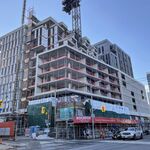Yes, but it sets Toronto apart by giving it way more power than other cities.
I stated "almost", because I hedged my recollection at this time. IIRC five other conurbations Ontario have specific acts for incorporation.
(A road toll, land transfer tax, parking tax, alcohol and tobacco tax or hotel tax is completely off-limits to any other city.
Not what I stated, and not what the Municipal Act states, let alone the specific Acts I mentioned.
Toronto can impose just about any tax that isn't explicitly banned in the City of Toronto Act.
How do you get that? Toronto can only impose taxes *inclusive* in their jurisdiction. The Act isn't based on exclusivity. That remains the domain of the Province and Parliament through various other statutes and acts.
Edit to Add: My recollection is compromised at this point due to illness, there are a number of Ontario municipal jurisdictions that are outside of the Municipal Act, about five last time I checked, but I can't recall them. Here's one:
City of Hamilton Act, 1999, S.O. 1999, c. 14, Sched. C
Versions
Regulations under this Act
current December 31, 2011 –
(e-Laws currency date)
January 1, 2011 – December 30, 2011
December 15, 2009 – December 31, 2010
7 more
Print
Download
Edit to Add:
[...]
Levies for various services
15. (1) The city may establish one or more municipal service areas and levy one or more special local municipality levies under section 312 of the
Municipal Act, 2001in the municipal service areas for the purpose of raising all or part of its costs for the following services, including the costs of establishing, constructing, maintaining, operating, improving, extending and financing those services:
1. The supply and distribution of water.
2. Fire protection and prevention.
3. Public transportation, other than highways.
4. Street lighting.
5. The collection and disposal of sewage. 1999, c. 14, Sched. C, s. 15 (1); 2002, c. 17, Sched. F, Table. [/quote]
As to what defines a "highway" would be itemized elsewhere in the Act itself, or the Min of Housing and Muni Affairs guides.




